新托福阅读2011年01月08日考题回顾
- 格式:doc
- 大小:80.00 KB
- 文档页数:2
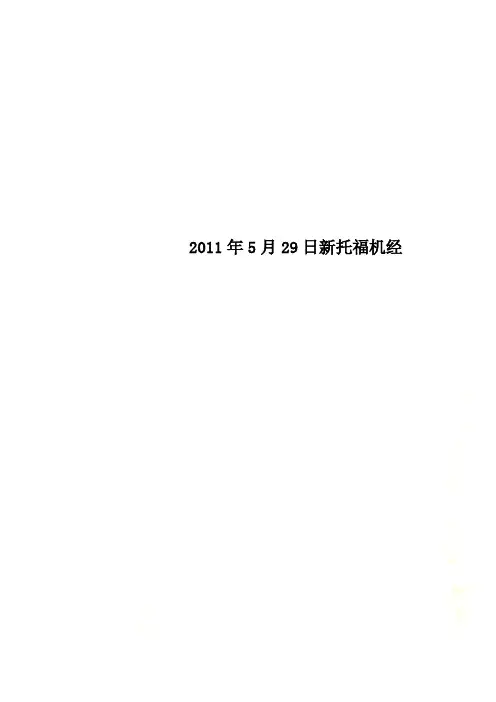
2011年5月29日新托福机经2011年5月29日新托福考试阅读机经:第一篇、一个词汇题,postulate=hypothesis一开始就挺难的找不到感觉,文章也看不进去,大家随便看看就好,这篇做得不好。
有错误欢迎指正。
实在很无语,做完我有一种欲哭无泪的感觉。
讲动物evolved的,大概就是说混血杂交什么的,开始有什么学家意见不符。
还有提到达尔文进化论,最后一段说基因相近的物种的杂交后代成功率适应性都比较强。
中间实在是记不住了。
我把康老师机经上的摘抄下来了,大家看看:有一部分讲到species breed,然后是一些理论。
倒数第二段提到Darwin 的进化论对这个问题的解释,但是作者的态度是质疑Darwin的解释的,同时提了一个问题反驳他的理论(有题),最后作者提到应该是物种在同类内Breed 比较有题,在同属内就有缺陷。
将动植物分类是很难的,以前很简单,就是按照外表和生理上不同来分类。
但是后来这种办法就落后,不管用。
以后就有了更科学的分类方法。
从四个方面来分类。
第二篇、大陆漂移nonscientist注意到AFRICA和australia 大陆的相似,但是一直是个疑问。
德国科学家Wegener 提出了大陆漂移的理论。
当时大家一致认为大陆的运动都是垂直运动,up and down的,但是W认为大陆运动是水平的。
他还用了化石的理论来解释。
W发现两个大陆在X世纪以前的动物化石非常相似,而且越古老的越相似(推论:X世纪以后两个大陆的动物怎么样了,我选相似越来越小)他指出这两块大陆原来是连一块的,后来才分开。
除了化石,W还用了别的方法来证明。
当时提出这个理论在德国是很震撼的,但是很快就set aside了。
这个理论在AFRICA和AUSTRALIA 是很受支持的,然后当时的主流学术期刊是欧洲发行的,欧洲科学家并不受支持(有考题),最后这个理论还是不被大众所接受。
一些科学家认为化石的相似性是由于以前两块大陆连着,后来板块沉没导致的,当时更有一个权威数学家极力反对。
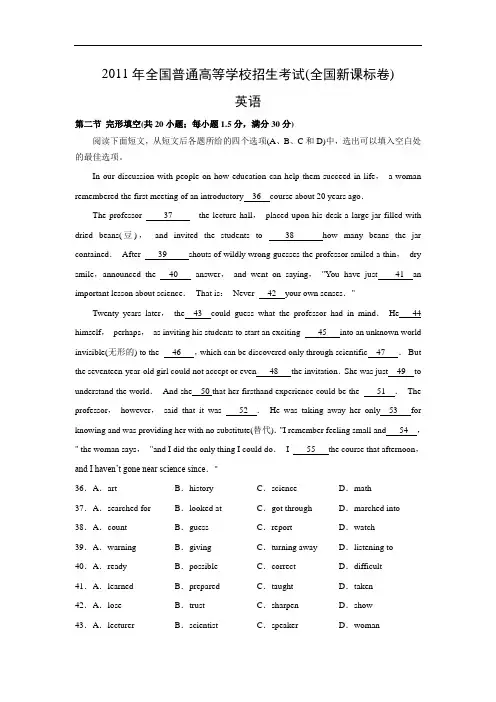
2011年全国普通高等学校招生考试(全国新课标卷)英语第二节完形填空(共20小题;每小题1.5分,满分30分)阅读下面短文,从短文后各题所给的四个选项(A、B、C和D)中,选出可以填入空白处的最佳选项。
In our discussion with people on how education can help them succeed in life,a woman remembered the first meeting of an introductory36course about 20 years ago.The professor 37 the lecture hall,placed upon his desk a large jar filled with dried beans(豆),and invited the students to 38 how many beans the jar contained.After 39 shouts of wildly wrong guesses the professor smiled a thin,dry smile,announced the 40answer,and went on saying,"You have just 41an important lesson about science.That is:Never 42your own senses."Twenty years later,the43could guess what the professor had in mind.He 44 himself,perhaps,as inviting his students to start an exciting 45 into an unknown world invisible(无形的) to the 46,which can be discovered only through scientific47.But the seventeen-year-old girl could not accept or even 48 the invitation.She was just 49to understand the world.And she 50 that her firsthand experience could be the 51.The professor,however,said that it was 52.He was taking away her only53for knowing and was providing her with no substitute(替代)."I remember feeling small and 54," the woman says,"and I did the only thing I could do.I 55the course that afternoon,and I haven’t gone near science since."36.A.art B.history C.science D.math 37.A.searched for B.looked at C.got through D.marched into 38.A.count B.guess C.report D.watch 39.A.warning B.giving C.turning away D.listening to 40.A.ready B.possible C.correct D.difficult 41.A.learned B.prepared C.taught D.taken 42.A.lose B.trust C.sharpen D.show 43.A.lecturer B.scientist C.speaker D.woman44.A.described B.respected C.saw D.served 45.A.voyage B.movement C.change D.rush 46.A.professor B.eye C.knowledge D.light 47.A.model B.senses C.spirit D.methods 48.A.hear B.make C.present D.refuse 49.A.suggesting B.beginning C.pretending D.waiting 50.A.believed B.doubted C.proved D.explained 51.A.growth B.strength C.faith D.truth 52.A.firm B.interesting C.wrong D.acceptable 53.A.task B.tool C.success D.connection 54.A.cruel B.proud C.frightened D.brave 55.A.dropped B.started C.passed D.missed36.C【解析】由第二段最后教授说的话可知,这是一节关于自然科学的课,因此填science。
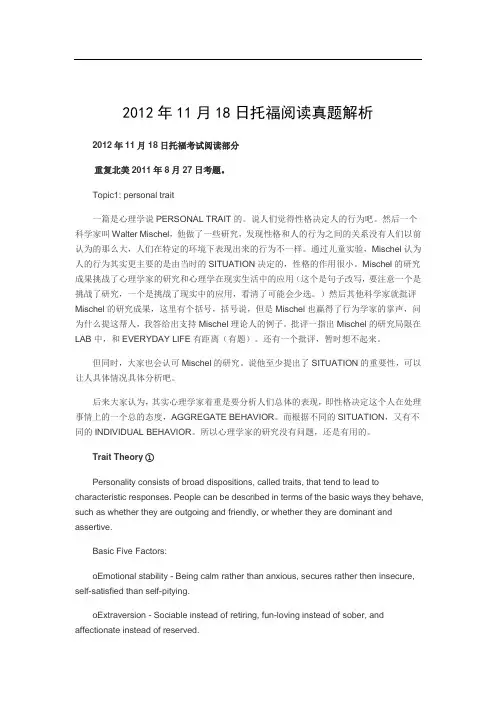
2012年11月18日托福阅读真题解析2012年11月18日托福考试阅读部分重复北美2011年8月27日考题。
Topic1: personal trait一篇是心理学说PERSONAL TRAIT的。
说人们觉得性格决定人的行为吧。
然后一个科学家叫Walter Mischel,他做了一些研究,发现性格和人的行为之间的关系没有人们以前认为的那么大,人们在特定的环境下表现出来的行为不一样。
通过儿童实验,Mischel认为人的行为其实更主要的是由当时的SITUATION决定的,性格的作用很小。
Mischel的研究成果挑战了心理学家的研究和心理学在现实生活中的应用(这个是句子改写,要注意一个是挑战了研究,一个是挑战了现实中的应用,看清了可能会少选。
)然后其他科学家就批评Mischel的研究成果,这里有个括号,括号说,但是Mischel也赢得了行为学家的掌声,问为什么提这帮人,我答给出支持Mischel理论人的例子。
批评一指出Mischel的研究局限在LAB中,和EVERYDAY LIFE有距离(有题)。
还有一个批评,暂时想不起来。
但同时,大家也会认可Mischel的研究。
说他至少提出了SITUATION的重要性,可以让人具体情况具体分析吧。
后来大家认为,其实心理学家着重是要分析人们总体的表现,即性格决定这个人在处理事情上的一个总的态度,AGGREGATE BEHAVIOR。
而根据不同的SITUATION,又有不同的INDIVIDUAL BEHAVIOR。
所以心理学家的研究没有问题,还是有用的。
Trait Theory ①Personality consists of broad dispositions, called traits, that tend to lead to characteristic responses. People can be described in terms of the basic ways they behave, such as whether they are outgoing and friendly, or whether they are dominant and assertive.Basic Five Factors:oEmotional stability - Being calm rather than anxious, secures rather then insecure, self-satisfied than self-pitying.oExtraversion - Sociable instead of retiring, fun-loving instead of sober, and affectionate instead of reserved.oOpenness - Imaginative rather than practical, preferring variety to routine, and being independent rather than conforming.oAgreeableness - Being softhearted, not ruthless, trusting, not suspicious, and helpful not uncooperative.oConscientiousness - Being organized rather than disorganized, careful rather then careless, and disciplined, not impulsive.Criticism to Trait Theory(Walter Mischel (1968))oPersonality and AssessmentoCriticized the trait view of personality, as well as the psychoanalytic approachoBoth emphasis the interval organization of personalityoPersonality often changes according to a given situation - response to personality as consisting of broad, internal traits that are consistence across situations and timeoTrait measure do a poor job of predicting actual behavioroSituationism - personality often varies considerably from one context to another.Trait Situation Interaction TheoryoThey believe that both trait (person) and situation variables are necessary to understand personality. They also agree that the degree of consistency in personality depend on the kinds of persons, situations, and behaviors sampled. (Pervin, 1993, Mischel, 1995)oThe link between traits and situations has been more precisely specified.oThe narrowing and more limited trait is, the more likely it will predict behavior.oSome people are consistent on some traitsoPersonality traits exert a stronger influence on an individual's behavior when situational influence is less powerful.Walter Mischel (1968) - Personality and Assessment, criticized trait view of personality and psychoanalytic approach. Said personality often changes according tosituations, unlike the previous approaches which show consistency. Said trait measures poorly predict actual behavior. Made view of situationism - personality varies considerably from one context to another.Most psychologists today are interactionists, believing in both trait and situation ideas to describe personality. Link between traits and situations specified: more limited and narrower a trait is, more likely it will predict a behavior; not everyone consistent on the same trait; traits give a strong influence on an individual's behavior when situational influences are less likely to affect personality.Walter Mischel ②Walter Mischel (born 1930) is an American psychologist specializing in personality theory and social psychology. He is the Robert Johnston Niven Professor of Humane Letters in the Department of Psychology at Columbia University.Contributions to personality theoryIn 1968, Mischel published the now classic monograph, Personality and Assessment, which created a paradigm crisis in personality psychology that changed the agenda of the field for decades. The book touched upon the problem in trait assessment that was identified by Allport back in 1937. Mischel showed that study after study failed to support the fundamental traditional assumption of personality theory, that an individual's behavior with regard to a trait (e.g. conscientiousness, sociability) is highly consistent across diverse situations. Instead, Mischel's analyses revealed that the individual's behavior, when closely examined, was highly dependent upon situational cues, rather than expressed consistently across diverse situations that differed in meaning.Mischel maintained that behavior is shaped largely by the exigencies of a given situation. That people act in consistent ways across different situations, reflecting an underlying consistency of personality traits, is a myth.[4]Mischel made the case that the field of personality psychology was searching for consistency in the wrong places. Instead of treating situations as the noise or "error of measurement" in personality psychology, Mischel's work proposed that by including the situation as it is perceived by the person and by analyzing behavior in its situational context, the consistencies that characterize the individual would be found. He argued that these individual differences would not be expressed in consistent cross-situational behavior, but instead, he suggested that consistency would be found in distinctive but stable patterns ofif-then, situation-behavior relations that form contextualized, psychologically meaningful "personality signatures" (e.g., "she does A when X, but B when Y").These signatures of personality were in fact revealed in a large observational study of social behavior across multiple repeated situations over time (Mischel&Shoda, 1995). Contradicting the classic assumptions, the data showed that individuals who were similar inaverage levels of behavior, for example in their aggression, nevertheless differed predictably and dramatically in the types of situations in which they aggressed. As predicted by Mischel, they were characterized by highly psychologically informative if-then behavioral signatures. Collectively, this work has allowed a new way to conceptualize and assess both the stability and variability of behavior that is produced by the underlying personality system, and has opened a window into the dynamic processes within the system itself (Mischel, 2004).Topic2: 昆虫的优势还有一篇讲昆虫的。
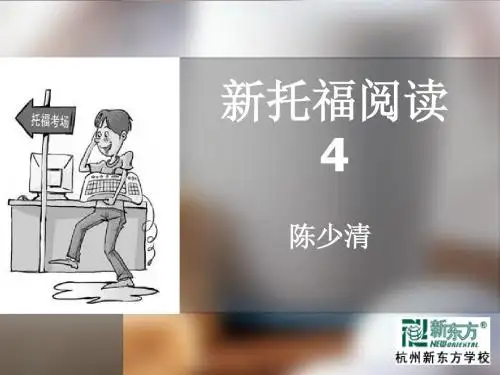
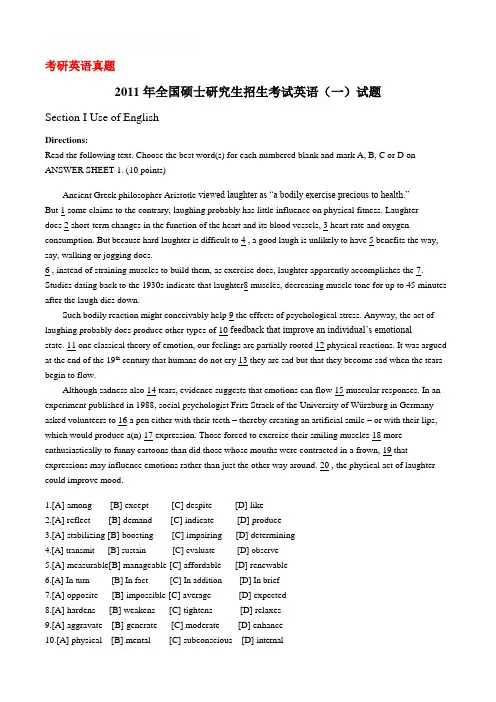
考研英语真题2011年全国硕士研究生招生考试英语(一)试题Section I Use of EnglishDirections:Read the following text. Choose the best word(s) for each numbered blank and mark A, B, C or D on ANSWER SHEET 1. (10 points)Ancient Greek philosopher Aristotle viewed laughter as “a bodily exercise precious to health.”But 1 some claims to the contrary, laughing probably has little influence on physical fitness. Laughterdoes 2 short-term changes in the function of the heart and its blood vessels, 3 heart rate and oxygen consumption. But because hard laughter is difficult to 4 , a good laugh is unlikely to have 5 benefits the way, say, walking or jogging does.6 , instead of straining muscles to build them, as exercise does, laughter apparently accomplishes the 7. Studies dating back to the 1930s indicate that laughter8 muscles, decreasing muscle tone for up to 45 minutes after the laugh dies down.Such bodily reaction might conceivably help 9 the effects of psychological stress. Anyway, the act of laughing probably does produce other types of 10 feedback that improve an individual’s emotionalstate. 11 one classical theory of emotion, our feelings are partially rooted 12 physical reactions. It was argued at the end of the 19th century that humans do not cry 13 they are sad but that they become sad when the tears begin to flow.Although sadness also 14 tears, evidence suggests that emotions can flow 15 muscular responses. In an experiment published in 1988, social psychologist Fritz Strack of the University of Würzburg in Germany asked volunteers to 16 a pen either with their teeth – thereby creating an artificial smile – or with their lips, which would produce a(n) 17 expression. Those forced to exercise their smiling muscles 18 more enthusiastically to funny cartoons than did those whose mouths were contracted in a frown, 19 that expressions may influence emotions rather than just the other way around. 20 , the physical act of laughter could improve mood.1.[A] among [B] except [C] despite [D] like2.[A] reflect [B] demand [C] indicate [D] produce3.[A] stabilizing [B] boosting [C] impairing [D] determining4.[A]transmit [B] sustain [C] evaluate [D] observe5.[A] measurable[B] manageable [C] affordable [D] renewable6.[A]In turn [B] In fact [C] In addition [D] In brief7.[A] opposite [B] impossible [C] average [D] expected8.[A] hardens [B] weakens [C] tightens [D] relaxes9.[A] aggravate [B] generate [C] moderate [D] enhance10.[A] physical [B] mental [C] subconscious [D] internal11.[A] Except for [B] According to [C] Due to [D] As for12.[A] with [B] on [C] in [D] at13.[A] unless [B] until [C] if [D] because14.[A] exhausts [B] follows [C] precedes [D] suppresses15.[A] into [B] from [C] towards [D] beyond16.[A]fetch [B] bite [C] pick [D]hold17.[A] disappointed [B] excited [C] joyful [D] indifferent18.[A] adapted [B] catered [C] turned [D] reacted19.[A]suggesting [B] requiring [C] mentioning[D] supposing20.[A] Eventually [B] Consequently [C] Similarly [D] ConverselySection II Reading ComprehensionPart ADirections:Read the following four texts. Answer the questions below each text by choosing A, B, C or D. Mark your answers on ANSWER SHEET 1. (40 points)Text 1The decision of the New York Philharmonic to hire AlanGilbert as its next music director has been the talk of the classical-music world ever since the sudden announcement of his appointment in 2009. For the most part, the response has been favorable, to say the least. “Hooray! At last!” wrote Anthony Tommasini, a sober-sided classical-music critic.One of the reasons why the appointment came as such a surprise, however, is that Gilbert is comparatively little known. Even Tommasini, who had advocated Gilbert’s appointment in the Times, calls him “an unpretentious musician with no air of the formidable conductor about him.” As a description of the next music director of an orchestra that has hitherto been led by musicians like Gustav Mahler and Pierre Boulez, that seems likely to have struck at least some Times readers as faint praise.For my part, I have no idea whether Gilbert is a great conductor or even a good one. To be sure, he performs an impressive variety of interesting compositions, but it is not necessary for me to visit Avery Fisher Hall, or anywhere else, to hear interesting orchestral music. All I have to do is to go to my CD shelf, or boot up my computer and download still more recorded music from iTunes.Devoted concertgoers who reply that recordings are no substitute for live performance are missing the point. For the time, attention, and money of the art-loving public, classical instrumentalists must compete not only with opera houses, dance troupes, theater companies, and museums, but also with the recorded performances of the great classical musicians of the 20th century. These recordings are cheap, available everywhere, and very often much higher in artistic qualit y than today’s live performances; moreover, they can be “consumed” at a time and place of the listener’s choosing. The widespread availability of such recordings has thus brought about a crisis in the institution of the traditional classical concert.One possible response is for classical performers to program attractive new music that is not yet available on record. Gilbert’s own interest in new music has been widely noted: Alex Ross, a classical-music critic, hasdescribed him as a man who is capable of t urning the Philharmonic into “a markedly different, more vibrant organization.” But what will be the nature of that difference? Merely expanding the orchestra’s repertoire will not be enough. If Gilbert and the Philharmonic are to succeed, they must first change the relationship between America’s oldest orchestra and the new audience it hopes toattract.21. We learn from Paragraph 1 that Gilbert’s appointment has[A] incurred criticism.[B] raised suspicion.[C] received acclaim.[D] aroused curiosity.22.Tommasini regards Gilbert as an artist who is[A] influential.[B] modest.[C] respectable.[D] talented.23. The author believes that the devoted concertgoers[A] ignore the expenses of live performances.[B] reject most kinds of recorded performances.[C] exaggerate the variety of live performances.[D] overestimate the value of live performances.24.According to the text, which of the following is true of recordings?[A] They are often inferior to live concerts in quality.[B] They are easily accessible to the general public.[C] They help improve the quality of music.[D] They have only covered masterpieces.25.Regarding Gilbert’s role in revitalizing the Philharmonic, the author feels[A] doubtful.[B] enthusiastic.[C] confident.[D] puzzled.Text 2When Liam McGee departed as president of Bank of America in August, his explanation was surprisingly straight up. Rather than cloaking his exit in the usual vague excuses, he came right out and said he was leaving “to pursue my goal of running a company.” Broadcasting his ambition was “very much my decision,” McGee says. Within two weeks, he was talking for the first time with the board of Hartford Financial Services Group, which named him CEO and chairman on September 29.McGee says leaving without a position lined up gave him time to reflect on what kind of company he wanted to run. It also sent a clear message to the outside world about his aspirations. And McGee isn’t alone. In recent weeks the No. 2 executives at Avon and American Express quit with the explanation that they were looking for a CEO post. As boards scrutinize succession plans in response to shareholder pressure, executiveswho don’t get the nod also may wish to move on. A turbulent business environment also has senior managers cautious of letting vague pronouncements cloud their reputations.As the first signs of recovery begin to take hold, deputy chiefs may be more willing to make the jump without a net. In the third quarter, CEO turnover was down 23% from a year ago as nervous boards stuck with the leaders they had, according to Liberum Research. As the economy picks up, opportunities will abound for aspiring leaders.The decision to quit a senior position to look for a better one is unconventional. For years executives and headhunters have adhered to the rule that the most attractive CEO candidates are the ones who mustbe poached. Says Korn/Ferry senior partner Dennis Carey: “I can’t think of a single search I’ve done where a board has not instructed me to look at sitting CEOs first.”Tho se who jumped without a job haven’t always landed in top positions quickly. Ellen Marram quit as chief of Tropicana a decade ago, saying she wanted to be a CEO. It was a year before she became head of a tiny Internet-based commodities exchange. Robert Willumstad left Citigroup in 2005 with ambitions to be a CEO. He finally took that post at a major financial institution three years later.Many recruiters say the old disgrace is fading for topperformers. The financial crisis has made it more acceptable to b e between jobs or to leave a bad one. “The traditional rule was it’s safer to stay where you are, but that’s been fundamentally inverted,” says one headhunter. “The people who’ve been hurt the worst are those who’ve stayed too long.”26.When McGee announced his departure, his manner can best be described as being[A] arrogant.[B] frank.[C] self-centered.[D] impulsive.27.According to Paragraph 2, senior executives’ quitting may be spurred by[A] their expectation of better financial status.[B] their need to reflect on their private life.[C] their strained relations with the boards.[D] their pursuit of new career goals.28.The word “poached” (Line 3, Paragraph 4) most probably means[A] approved of.[B] attended to.[C] hunted for.[D] guarded against.29.It can be inferred from the last paragraph that[A] top performers used to cling to their posts.[B] loyalty of top performers is getting out-dated.[C] top performers care more about reputations.[D] it’s safer to stick to the traditional rules.30.Which of the following is the best title for the text?[A] CEOs: Where to Go?[B] CEOs: All the Way Up?[C] Top Managers Jump without a Net[D] The Only Way Out for Top PerformersText 3The rough guide to marketing success used to be that you got what you paid for. No longer. While traditional “paid” media—such as television commercials and print advertisements – still play a major role, companies today can exploit many alternative forms of media. Consumers passionate about a product may create “earned” media by willingly promoting it to friends, and a company may leverage “owned” media by sending e-mail alerts about products and sales to customers registered with its Web site. The way consumers now approach the process of making purchase decisions means that marketing’s impact stems from a broad range of factors beyond conventional paid media.Paid and owned media are controlled by marketers promoting their own products. For earned media, such marketers act as the initiator for users’ responses. But in some cases, one marketer’s owned media become another marketer’s paid media – for instance, when an e-commerce retailer sells ad space on its Web site. We define such sold media as owned media whose traffic is so strong that other organizations place their content or e-commerce engines within that environment. This trend, which we believe is still in its infancy, effectively began with retailers and travel providers such as airlines and hotels and will no doubt go further. Johnson & Johnson, for example, has created BabyCenter, a stand-alone media property that promotes complementary and even competitive products. Besides generating income, the presence of other marketers makes the site seem objective, gives companies opportunities to learn valuable information about the appeal of other companies’ marketing, and may help expand user traffic for all companies concerned.The same dramatic technological changes that have provided marketers with more (and more diverse) communications choices have also increased the risk that passionate consumers will voice their opinions in quicker, more visible, and much more damaging ways.Such hijacked media are the opposite of earned media: an asset or campaign becomes hostage to consumers, other stakeholders, or activists who make negative allegations about a brand or product. Members of social networks, for instance, are learning that they can hijack media to apply pressure on the businesses that originally created them.If that happens, passionate consumers would try to persuade others to boycott products, putting the reputation of the target company at risk. In such a case, the company’s response may not be sufficiently quick or thoughtful, and the learning curve has been steep. Toyota Motor, for example, alleviated some of the damage from its recall crisis earlier this year with a relatively quick and well-orchestrated social-media response campaign, which included efforts to engage with consumers directly on sites such as Twitter and the social-news site Digg.31. Consumers ma y create “earned” media when they are[A] obsessed with online shopping at certain Web sites.[B] inspired by product-promoting e-mails sent to them.[C] eager to help their friends promote quality products.[D] enthusiastic about recommending their favorite products.32. According to Paragraph 2, sold media feature[A] a safe business environment.[B] random competition.[C] strong user traffic.[D] flexibility in organization.33. The author indicates in Paragraph 3 that earned media[A] invite constant conflicts with passionate consumers.[B] can be used to produce negative effects in marketing.[C] may be responsible for fiercer competition.[D] deserve all the negative comments about them.34. Toyota Motor’s experience is cited as an example of[A] responding effectively to hijacked media.[B] persuading customers into boycotting products.[C] cooperating with supportive consumers.[D] taking advantage of hijacked media.35. Which of the following is the text mainly about?[A] Alternatives to conventional paid media.[B] Conflict between hijacked and earned media.[C] Dominance of hijacked media.[D] Popularity of owned media.Text 4It’s no surprise that Jennifer Senior’s insightful, provocative magazine cover story, “I Love My Children, I Hate My Life,” is arousing much chatter – nothing gets people talking like the suggestion that child rearing is anything less than a completely fulfilling, life-enriching experience. Rather than concluding that children make parents either happy or miserable, Senior suggests we need to redefine happiness: instead of thinking of it as something that can be measured by moment-to-moment joy, we should consider being happy as a past-tense condition. Even though the day-to-day experience of raising kids can be soul-crushingly hard, Senior writes that “the very things that in the moment dampen our moods can later be sources of intense gratification and delight.”The magazine cover showing an attractive mother holding a cute baby is hardly the onlyMadonna-and-child image on newsstands this week. There are also stories about newly adoptive – and newly single –mom Sandra Bullock, as well as the usual “Jennifer Aniston is pregnant” news. Practically every week features at least one celebrity mom, or mom-to-be, smiling on the newsstands.In a society that so persistently celebrates procreation, is it any wonder that admitting you regret having children is equivalent to admitting you support kitten-killing? It doesn’t seem quite fair, then, to compare the regrets of parents to the re grets of the childless. Unhappy parents rarely are provoked to wonder if they shouldn’t have had kids, but unhappy childless folks are bothered with the message that children are the single most important thing in the world:obviously their misery must be a direct result of the gaping baby-size holes in their lives.Of course, the image of parenthood that celebrity magazines like Us Weekly and People present is hugely unrealistic, especially when the parents are single mothers like Bullock. According to several studies concludingthat parents are less happy than childless couples, single parents are the least happy of all. No shock there, considering how much work it is to raise a kid without a partner to lean on; yet to hear Sandra and Britney tell it, raisi ng a kid on their “own” (read: with round-the-clock help) is a piece of cake.It’s hard to imagine that many people are dumb enough to want children just because Reese and Angelina make it look so glamorous: most adults understand that a baby is not a hair cut. But it’s interesting to wonder if the images we see every week of stress-free, happiness-enhancing parenthood aren’t in some small, subconscious way contributing to our own dissatisfactions with the actual experience, in the same way that a small part of us hoped getting “the Rachel” might make us look just a little bit like Jennifer Aniston.36.Jennifer Senior suggests in her article that raising a childcan bring[A] temporary delight.[B] enjoyment in progress.[C] happiness in retrospect.[D] lasting reward.37.聽We learn from Paragraph 2 that[A] celebrity moms are a permanent source for gossip.[B] single mothers with babies deserve greater attention.[C] news about pregnant celebrities is entertaining.[D] having children is highly valued by the public.38. It is suggested in Paragraph 3 that聽childless folks[A] are constantly exposed to criticism.[B] are largely ignored by the media.[C] fail to fulfill their social responsibilities.[D] are less likely to be satisfied with their life.39.According to Paragraph 4, the message conveyed by celebrity magazines is[A] soothing.[B] ambiguous.[C] compensatory.[D] misleading.40.Which of the following can be inferred from the last paragraph?[A] Having children contributes little to the glamour of celebrity moms.[B] Celebrity moms have influenced our attitude towards child rearing.[C] Having children intensifies our dissatisfaction with life.[D] We sometimes neglect the happiness from child rearing.Part BDirections:The following paragraphs are given in a wrong order. For questions 41-45, you are required to reorganize these paragraphs into a coherent text by choosing from the list A-G and filling them into the numberedboxes.Paragraphs E and G have been correctly placed.Mark your answers on ANSWER SHEET 1. (10 points) [A] No disciplines have seized on professionalism with as much enthusiasm as the humanities. You can, Mr Menand points out, become a lawyer in three years and a medical doctor in four. But the regular time it takesto get a doctoral degree in the humanities is nine years. Not surprisingly, up to half of all doctoral students in English drop out before getting their degrees.[B] His concern is mainly with the humanities: literature, languages, philosophy and so on. These are disciplines that are going out of style: 22% of American college graduates now major in business compared with only 2% in history and 4% in English. However, many leading American universities want their undergraduates to have a grounding in the basic canon of ideas that every educated person should possess. But most find it difficult to agree on what a “general education” should look like. At Harvard, Mr Menand notes, “the great books are read because they have been read” – they form a sort of social glue.[C] Equally unsurprisingly, only about half end up with professorships for which they entered graduate school. There are simply too few posts. This is partly because universities continue to produce ever more PhDs. But fewer students want to study humanities subjects: English de partments awarded more bachelor’s degrees in 1970-71 than they did 20 years later. Fewer students require fewer teachers. So, at the end of a decade of thesis-writing, many humanities students leave the profession to do something for which they have not been trained.[D] One reason why it is hard to design and teach such courses is that they cut across the insistence by top American universities that liberal-arts education and professional education should be kept separate, taught in different schools. Many students experience both varieties. Although more than half of Harvard undergraduates end up in law, medicine or business, future doctors and lawyers must study a non-specialist liberal-arts degree before embarking on a professional qualification.[E] Besides professionalising the professions by this separation, top American universities have professionalised the professor. The growth in public money for academic research has speeded the process: federal research grants rose fourfold between 1960 and 1990, but faculty teaching hours fell by half as research took its toll. Professionalism has turned the acquisition of a doctoral degree into a prerequisite for a successful academic career: as late as 1969 a third of American professors did not possess one. But the key idea behind professionalisation, argues Mr Menand, is that “the knowledge and skills needed for a particular specialisation are transmissible but not transferable.” So disciplines acquire a monopoly not just over the production of knowledge, but also over the production of the producers of knowledge.[F] The key to reforming higher education, concludes Mr Menand, is to alter the way in which “the producers of knowledge are produced.” Otherwise, academics will continue to think dangerously alike, i ncreasingly detached from the societies which they study, investigate and criticise. “Academic inquiry, at least in some fields, may need to become less exclusionary and more holistic.” Yet quite how that happens, Mr Menand does not say.[G] The subtle and intelligent little book The Marketplace of Ideas: Reform and Resistance in the American University should be read by every student thinking of applying to take a doctoral degree. They may then decide to go elsewhere. For something curious has been happening in American universities, and Louis Menand, a professor of English at Harvard University, captured it skillfully.41. → 42. → E → 43. → 44. → 45.Part CDirections:Read the following text carefully and then translate the underlined segments into Chinese. Your translation should be written clearly onANSWER SHEET 2. (10 points)With its theme that “Mind is the master weaver,” creating our inner character and outer circumstances, the book As a Man Thinketh by James Allen is an in-depth exploration of the central idea of self-help writing.(46) Allen’s contribution was to take an assumption we all share – that because we are not robots we therefore control our thoughts – and reveal its erroneous nature. Because most of us believe that mind is separate from matter, we think that thoughts can be hidden and made powerless; this allows us to think one way and act another. However, Allen believed that the unconscious mind generates as much action as the conscious mind, and (47)while we may be able to sustain the illusion of control through the conscious mind alone, in reality we are continually faced with a question: “Why cann ot I make myself do this or achieve that?”Since desire and will are damaged by the presence of thoughts that do not accord with desire, Allen concluded: “We do not attract what we want, but what we are.” Achievement happens because you as a person embody the external achievement; you don’t “get”success but become it. There is no gap between mind and matter.Part of the fame of Allen’s book is its contention that “Circumstances do not make a person, they reveal him.” (48) This seems a justification for neglect of those in need, and a rationalization of exploitation, of the superiority of those at the top and the inferiority of those at the bottom.This, however, would be a knee-jerk reaction to a subtle argument. Each set of circumstances, however bad, offers a unique opportunity for growth. If circumstances always determined the life and prospects of people, then humanity would never have progressed. In fact, (49) circumstances seem to be designed to bring out the best in us, and if we feel that we have been “wronged” then we are unlikely to begin a conscious effort to escape from our situation. Nevertheless, as any biographer knows, a person’s early life and its conditions are often the greatest gift to an individual.The sobering aspect of Allen’s book is t hat we have no one else to blame for our present condition except ourselves. (50) The upside is the possibilities contained in knowing that everything is up to us; where before we were experts in the array of limitations, now we become authorities of what is possible.Section III WritingPart A51. Directions:Write a letter to a friend of yours to1) recommend one of your favorite movies and2) give reasons for your recommendation.You should write about 100 words on ANSWER SHEET 2.Do not sign your own na me at the end of the letter. Use “Li Ming” instead.Do not write the address. (10 points)Part B52. Directions:Write an essay of 160-200 words based on the following drawing. In your essay, you should1) describe the drawing briefly,2) explain its intended meaning, and3) give your comments.You should write neatly on ANSWER SHEET 2. (20 points)旅程之“余”2011年全国硕士研究生招生考试英语(一)答案详解Section I Use of English一、文章题材结构分析文章出自 2009年4月的《科学美国人》(Scientific American), 作者 Steve Ayan, 原文题目为 How Humor Makes You Friendlier, Sexier:幽默如何使你更加有人缘且性感。
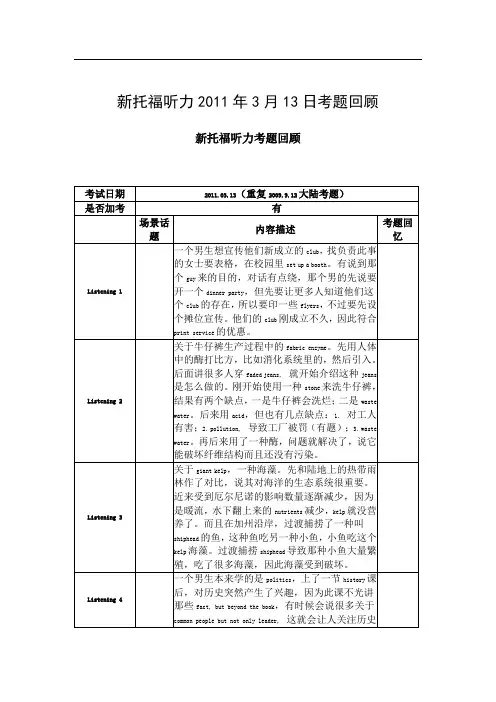
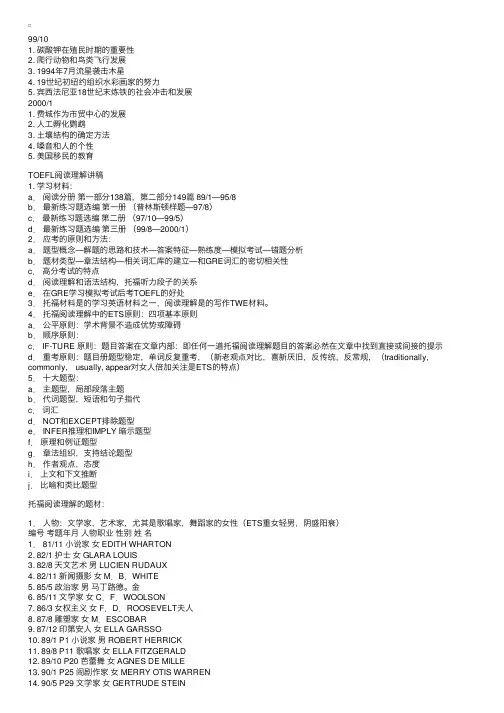
99/101. 碳酸钾在殖民时期的重要性2. 爬⾏动物和鸟类飞⾏发展3. 1994年7⽉流星袭击⽊星4. 19世纪初纽约组织⽔彩画家的努⼒5. 宾西法尼亚18世纪末炼铁的社会冲击和发展2000/11. 费城作为市贸中⼼的发展2. ⼈⼯孵化鹦鹉3. ⼟壤结构的确定⽅法4. 嗓⾳和⼈的个性5. 美国移民的教育TOEFL阅读理解讲稿1. 学习材料:a.阅读分册第⼀部分138篇,第⼆部分149篇 89/1—95/8b.最新练习题选编第⼀册(普林斯顿样题—97/8)c.最新练习题选编第⼆册(97/10—99/5)d.最新练习题选编第三册(99/8—2000/1)2.应考的原则和⽅法:a.题型概念—解题的思路和技术—答案特征—熟练度—模拟考试—错题分析b.题材类型—章法结构—相关词汇库的建⽴—和GRE词汇的密切相关性c.⾼分考试的特点d.阅读理解和语法结构,托福听⼒段⼦的关系e.在GRE学习模拟考试后考TOEFL的好处3.托福材料是的学习英语材料之⼀,阅读理解是的写作TWE材料。
4.托福阅读理解中的ETS原则:四项基本原则a.公平原则:学术背景不造成优势或障碍b.顺序原则:c. IF-TURE 原则:题⽬答案在⽂章内部:即任何⼀道托福阅读理解题⽬的答案必然在⽂章中找到直接或间接的提⽰d.重考原则:题⽬册题型稳定,单词反复重考,(新⽼观点对⽐,喜新厌旧,反传统,反常规,(traditionally,commonly, usually, appear对⼥⼈倍加关注是ETS的特点)5.⼗⼤题型:a.主题型,局部段落主题b.代词题型,短语和句⼦指代c.词汇d. NOT和EXCEPT排除题型e. INFER推理和IMPLY 暗⽰题型f.原理和例证题型g.章法组织,⽀持结论题型h.作者观点,态度i.上⽂和下⽂推断j.⽐喻和类⽐题型托福阅读理解的题材:1.⼈物:⽂学家,艺术家,尤其是歌唱家,舞蹈家的⼥性(ETS重⼥轻男,阴盛阳衰)编号考题年⽉⼈物职业性别姓名1. 81/11 ⼩说家⼥ EDITH WHARTON2. 82/1 护⼠⼥ GLARA LOUIS3. 82/8 天⽂艺术男 LUCIEN RUDAUX4. 82/11 新闻摄影⼥ M.B.WHITE5. 85/5 政治家男马丁路德。
最权威的国际教育服务平台
资料来源:教育优选 http://www.jybest.cn/
新托福阅读2011年01月08日考题回顾
新托福阅读考题回顾
考试日期 2011.01.08
Passage 1
Title:
Starfish
大致内容
写的是关于珊瑚礁的问题,分析海星对于珊瑚岛威胁。
starfish可以对珊瑚礁造成很严重的伤害(有题),一只
吃一大片珊瑚礁,但是对于starfish可以在珊瑚礁上大量
繁殖的动机有很多说法,但是至今应该还没有确定。有自
然环境的原因,暴风雨和人为原因。
人类污染或炸药捕捞过后,天敌少了,他们吃更多珊瑚礁,
难以恢复。
Passage 2
Title:
莫斯科的发展
大致内容
第一段讲蒙古帝国完掉后,莫斯科如何成为俄罗斯的重
镇。
第二段讲莫斯科的地理位置、地理学家的猜测。因为是交
通枢纽,又是河流的交汇处,四条水路通四个城市,免于战
乱。河流的交汇有利于发展贸易什么的,就开始讲经济了,
主要是农业发达,后来好像又绕回地理位置了,说莫斯科
一马平川,没有山,易于扩张(有题)。
最后讲社会很和谐,主要是王位继承十分顺利,没有uncle
跟他们抢,只有一个例外(有题)最后说稳定要归功于他
们英明伟大的先王比较注意守住自己的权利,而不是一味
扩张。
最权威的国际教育服务平台
资料来源:教育优选 http://www.jybest.cn/
Passage 3
Title:
森林生态环境的垂直分层现象
大致内容
是关于一个完整的雨林生态形成的过程,每段有各自不同
的特点(有题)。
树林有两个重要的周期,一个是primary 周期,在这个周
期里,主要过程是树的成长,从种子长成大树。因此需要
很长的过程,有细节是:种子轻的树、能够吸收外界环境
(如空气)的树比种子重的、只能依靠土壤吸收营养的树
更容易繁殖和存活(此处有题)。
另一个周期是second 周期,这个周期里各种自然灾害(好
像也包括了人类的砍伐活动)会损害树林,但是同时也把
一些发育不好的树给干掉了,因此树林就更加成熟了。
接下来就是衰退期。衰退期的特征是树末(有一个专有名
词,我忘了,意思好像是树枝的末梢)有变化。
后来就是老年期old。有些树永远无法达到老年期,因为
他们在最茂盛的时候就被什么因素(好像是人类)给干掉
了(此处有题,问树林为什么无法达到老年期)。
点评:
本次新托福阅读重复2009.12.11北美。
加试:
1. 关于telephone and telegram在美国和在欧洲的发展
电讯在欧美不同的发展。电讯欧洲国有,在美国私有竞争到垄断出现要政府规范操作。
之前主要为蒸汽机的变革,出现后促进效果。邮政力量被低估。
2. Birds Songs
鸟类发的歌声是天生的,四个月大的鸟关在笼子里面,让他们听自己的母语,可以学习。
放其他声音,没有意向学习。